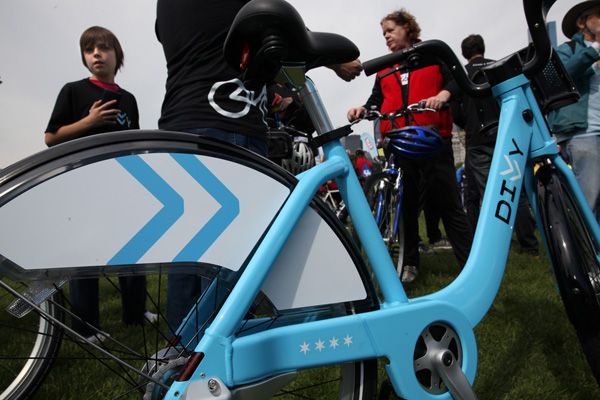
Photo: Nancy Stone/Chicago Tribune
Chicago's Divvy bikeshare program kicks off next month; registration began today at noon, with various perks offered. Here's a map of current and planned stations. Our bike share program starts off just after New York began its bike share program, and the residents of America's most dense, urbane metropolis have been having a month-long meltdown about it. It's pretty adorable.
For the last year, and even more so over the past several weeks since docking stations began to be installed all over the city, local media coverage has appeared to reflect something akin to a collective public meltdown over these bicycles. From the perspective of a city like Washington, D.C., where bike-share has not only been around for some time but proved to be a massive success, it's been a frustrating, if occasionally amusing, trajectory to watch unfold.
In New York, the costs are $10 per day, $25 per week, or $95 per year, and trips under 45 minutes are free; after that it's $2.50 for the next half hour, and $9 for each additional half hour. (That's comparable to Chicago: $7 a day, $75 a year, with trips under 30 minutes free, $1.50 for the next half hour, $4.50 for the one after, and $6 thereafter. The number of trips is unlimited; the charges keep people from checking out a bike all day even if they're not biking much.)
The expenses have led a number of people, like Felix Salmon, to wonder why anyone would use it instead of taking a cab or buying a bike. It's an interesting if not terribly well-considered question. There are a number of ways in which using a bike share is preferable to owning a bike, or even to using public transportation.
1. For commuters, locking your bike is a crapshoot. If you use the Metra, bikes aren't permitted on trains that arrive in Chicago before 9:30 AM, or leaving Chicago between 3 PM and 7 PM. So that's two bikes, one for each end of the commute. Some Metra stops have bike lockers. Union Station doesn't; Steven Vance writes that "bike connections to major train stations in Chicago is woeful," and that at Union Station and Millennium Station, "all bike parking is unguarded and far from the tracks." So that's two bikes plus however many get stolen or damaged when locked up overnight a couple hundred times a year.
Today I'm going out to the 'burbs and wanted to bike to the Metra station, lock my bike, and then ride it back to work in the morning. I surveyed Twitter and the responses were "lock with caution," "it's a little Mad Max at night," and "the lots over at Union look a little smash-and-grabby." Unfortunately I rode my okay bike instead of my hideous old women's Raleigh pseudo-mountain-bike, which is worth less than its tires.
2. Bike share is really meant for commutes, not recreational rides. One of the complaints is that tooling around all day is expensive. In Chicago, riding around for five hours on the same bike would cost $54. Do that twice and you could afford your own beater. But a half-hour is a pretty long ride, about the length of my commute from Humboldt Park to downtown. Union Station to the Tribune Tower is about 15 minutes. From Union Station to the Lincoln Park Zoo is about half an hour, probably a little less. Most people, commuters and tourists both, intend to go from place to place.
3. It's cheaper, and sometimes faster, than public transportation. I have a pretty friendly commute, a straight shot on the Grand bus. On a good day and not at rush hour, it takes half an hour on the bus, identical to biking. At rush hour, it can take 45 minutes (most of that getting to the river). It costs $100 a month, or more than an annual bike-share pass costs. A hypothetical commute from Union Station to Lincoln Park Zoo takes about 30 minutes on public transportation, and an estimated 22-24 minutes on bike, according to Google Maps.
Unsurprisingly, some of the surveys that have been done of bike share programs in the U.S. find that users tend to mode-shift from public transportation. A yearly Divvy pass is the equivalent of 37.5 bus rides, or 33 train rides, so it makes some sense for the occasional commuter.
4. You don't have to deal with (or pay for) maintenance. If you don't do all your own maintenance—what, you don't true your own wheels?—you do have to keep your bike running well. A basic tune-up at Rapid Transit in Wicker Park, where I usually go, is $70, and goes up to $200. Once a year is pretty reasonable for a tune-up; depending on where you go and what you have done, that's approaching or more than the bike-share cost.
There are still plenty of reasons to get a bike instead of using Divvy. Their bikes don't have racks and only a small front basket; having a rack or a big back basket (I have an ugly, functional milk crate) is nice if you're shopping or don't want to sweat into a backpack. They're only three speeds (but in Chicago you don't really need that many speeds). They aren't particularly fast or nimble (not a bad thing, if Divvy will be unleashing a bunch of new riders).


